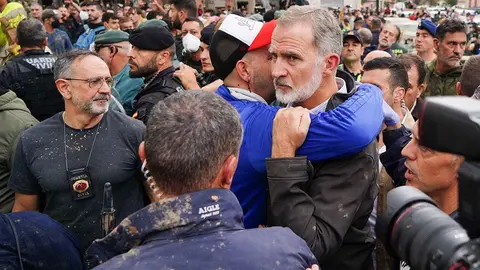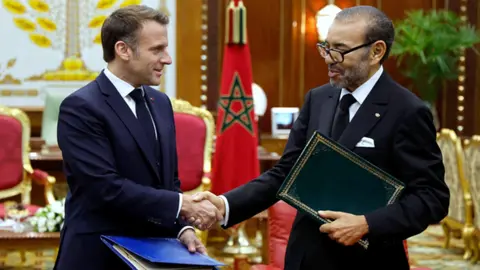Morocco in another dimension

In these times of high risk of interference and intoxication with fake news, it is necessary to go to the places where the events are taking place and see first-hand what is happening. And to prevent a few people who make a lot of noise and use violence and social networks from imposing their interests with what they count on.
It has happened to King Felipe VI in Paiporta. Of course the indignation and anger of those people in the towns of Valencia who have lost everything is more than justified by the nefarious management, once again, of Pedro Sánchez's government. But it has been a few, organised, who have incited others to insult and throw mud at the kings and the Valencian president, while Sánchez fled at the drop of a hat. Felipe VI, Leticia and Mazón have stood up for themselves and the monarch has made it very clear to the young people: do not believe everything, there is a lot of misinformation, a lot of intoxication because there are those who are interested in creating chaos. That is what authoritarian populists who crave power and spare no means to achieve it live on.
The D-day and H-hour that we have been waiting for and suffering for the last few months is coming. We are all watching and grieving for the election results in the United States. The Israelis, the Palestinians, the Ukrainians, the Europeans, the Russians, the Chinese. Whatever happens, it will affect us all. For example, the inhabitants of the place where I am writing this article: the Saharawis in the province of Dakhla, the former Villa Cisneros. The Classic Car Rally went all the way to Guerguerat, the border post between Morocco and Mauritania, in order to promote the Moroccanness of the Sahara. Mobilisation of Moroccan civil society in support of the inhabitants of the south of the North African country.
How necessary it is to go to the places, talk to the people and really know what is going on, what they think and want, and what they need and demand in the majority. Their life today, in the southern provinces under Moroccan sovereignty and already practising a broad autonomy that needs to be legitimised internationally within the United Nations, is going on with security, stability and waiting for new investments to improve their jobs and their lives. They long for their relatives who are trapped in the Tindouf camps, on Algerian soil and under the tight control of the Polisario Front in very precarious conditions. The new resolution on the Sahara and the renewal of the mandate of Minurso, its forces in the Sahara, takes up the Moroccan proposal as a good basis for negotiation and reference for negotiating a definitive solution to the conflict. This new international step comes after the spectacular official reconciliation trip of French President Emmanuel Macron to Rabat, where Mohammed VI offered him a mass bath in the streets and the signing of a Renewed Exceptional Partnership and 22 collaboration agreements in key sectors such as infrastructure, high-speed rail, renewable energies, water management, logistics and agri-food, among others.
Morocco is radically changing its dimension. After the huge and important agreements signed with the United Arab Emirates, it is now France's turn. Just take a look at some of the agreements signed with French credit backing, which is important.
The world's second largest desalination plant will open in the North African country, providing water for 9.3 million people. Thales and Panafsat will jointly build a Moroccan satellite communications system. Objective? To provide very high-speed internet connectivity to 26 African countries. The high-speed network is extended with the train of the future to be built in Fez. With agreements with other countries, Morocco will become an international aeronautical hub. Major supplier of green hydrogen. Decarbonisation and research centre.
A whole series of projects and realities that should serve to overcome the bureaucratic problems and mismanagement in some cases that are detrimental to citizens. Such as, for example, signing contracts and executing tenders to achieve the water management that Morocco needs with more desalination plants and the planned infrastructure works that are taking a long time to be carried out.
Morocco is a truly emerging country that still faces serious problems of inequality, wealth distribution and water management, among the most crucial. The changes in the government are intended to give new impetus to the challenges facing Morocco, where there must be room for everyone.
France's return should not mean Spain's withdrawal. On the contrary, the triangle between Morocco, Spain and France must work and complement each other to achieve progress, development and modernisation in North Africa, which means better guarantees of security and stability.



